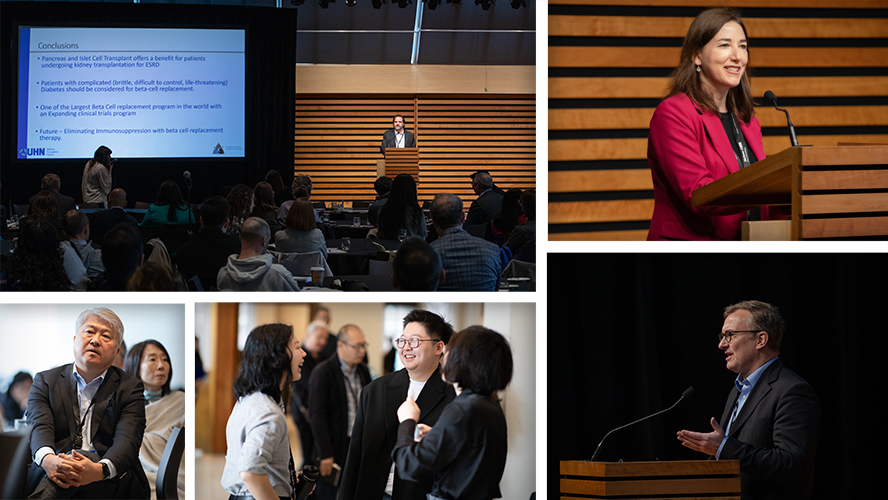
UHN’s McEwen Stem Cell Institute (McEwen) recently held its inaugural research symposium: “Charting the Path to Stem Cell-Based Therapies.”
The symposium was a one-day event that showcased the latest advances and innovations in the field of cell therapy and regenerative medicine. A total of 180 attendees participated in the event and heard talks from experts over the course of four sessions moderated by UHN scientists and trainees.
One of the goals of the symposium was to showcase the latest efforts in the development of cell therapies using cells derived from human pluripotent stem cells (hPSCs) to treat a range of debilitating and degenerative diseases.
Some of the most advanced work in the field was presented by the keynote speaker, Dr. Viviane Tabar, Chair of Neurosurgery at Memorial Sloan Kettering Cancer Center, who presented an overview of cell therapy approaches to treat Parkinson’s disease. Dr. Tabar also discussed recent findings from a phase 1 clinical trial run by BlueRock Therapeutics, aimed at treating patients with transplanted hPSC-derived neurons. To date, 12 patients have been treated—nine in New York and three at the Toronto Western Hospital.
Dr. Trevor Reichman, Clinician Investigator at Toronto General Hospital Research Institute (TGHRI), presented new therapeutic approaches to treat type 1 diabetes and described the success here in Toronto of whole pancreatic and islet transplantation as a therapy to treat this disease. He also gave an overview of one of the newest potential therapies for type 1 diabetes—the transplantation of hPSC-derived pancreatic cells as a means of restoring insulin production. This is part of the ongoing Vertex Pharmaceuticals-sponsored clinical trial at UHN.
The symposium also featured talks from several McEwen investigators who presented their studies on hPSC-based cell replacement therapies. Dr. Cristina Nostro discussed pancreatic beta-cell replacement therapies and highlighted the role played by macrophages—a type of white blood cell—in the survival and function of hPSC-derived insulin-producing cells following transplantation.
Dr. Michael Laflamme provided an overview of advances in cell therapy to treat heart failure and showed that the maturation state of the transplanted heart muscle cells plays an important role in the ability of these cells to function in the damaged heart.
With a focus on the heart’s electrical conduction system, Dr. Stephanie Protze reviewed her lab’s efforts in generating cardiac pacemaker cells from hPSCs as a first step in engineering a biological pacemaker.
The final speaker from the McEwen Institute, Dr. Shinichiro Ogawa, described his team’s success in generating hPSC-derived functional liver cells and 3D-bio-printed liver tissue to develop cell and tissue-based therapies to treat patients with liver failure.
Several speakers presented strategies to address the issue of rejection of transplanted cells. Dr. Sonja Schrepfer from the University of California, San Francisco described using genetic engineering to alter hPSCs so that derived cells are not recognized by the immune system. Dr. Elmar Jaeckel, Medical Director, Liver Transplantation at Ajmera Transplant Centre, discussed using T regulatory cells— a specific type of immune cell— to inhibit immune responses and prevent graft rejection.
Beyond cell-based therapies, the symposium hosted speakers who presented work on different approaches to studying and treating disease.
Dr. Adam Feinberg, Professor, at Carnegie Mellon University, described his group’s most recent efforts to 3D-bio-print a functional heart chamber. Dr. Lior Zangi, Associate Professor at Icahn Genomics Institute, described work that uses a modified RNA-based approach to introduce new molecules into heart cells to promote their proliferation and enhance their function.
Dr. Mitch Weiss, Chair of Hematology, St. Jude’s Research Hospital, gave an overview of blood cell disease caused by dysregulation of hemoglobin production and described the latest CRISPR-based genome engineering being used to treat these patients.
The presentations of Dr. Karun Singh, a Senior Scientist, at Krembil Research Institute, and Dr. Yun Li, Scientist, at The Hospital for Sick Children, highlighted the power of the hPSC system to model aspects of human neurological diseases.
Finally, Dr. Jonathan Kimmelman, Associate Professor, at McGill University, reviewed the ethical, social, and economic challenges associated with transitioning a new therapy to the clinic.
“The symposium was not only a way to highlight the work done at McEwen, but also served as a platform to hear from international experts and leaders in the field of stem cell and regenerative medicine,” says Dr. Gordon Keller, Director of the McEwen Stem Cell Institute. “We are grateful to everyone who participated in this event and helped to make it such a success,”
The McEwen symposium was made possible due to support from the Krembil Foundation, Centre for Commercialization of Regenerative Medicine, Vistagen, Blue Rock Therapeutics, Medicine by Design, Stem Cell Network, PHC Corporation of North America, and Stem Cell Technologies.




